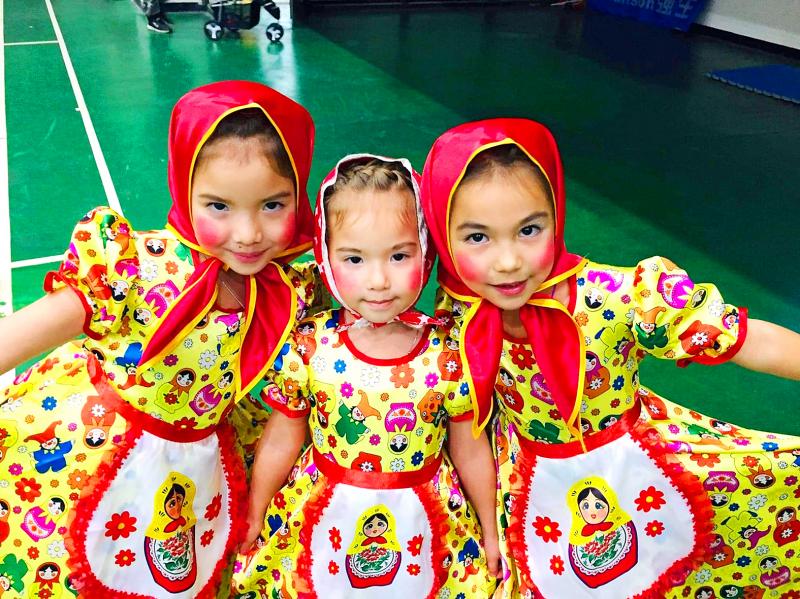Turns out the Russians are coming after all.
The Taiwan Russian Club is hosting its annual New Year Charity Concert on Sunday in Taichung, featuring traditional dancing and musical performances by 30 local groups.
Now in its sixth year, the event raises money for Believe in a Miracle, a charity based in Kaliningrad, Russia that aids needy children and their families.

Photo courtesy of Julia Startchenko
“It’s all about Russian people connecting with each other,” Julia Startchenko, an event organizer, said.We’re creating a good image of our country.”
Sunday’s charity concert comes after performances of the Moscow Classical Ballet were canceled in Taipei and Kaohsiung.
Tea and snacks will be available, as will samples of Ukrainian honey. Grandfather Frost — the Russian version of Santa Claus — will be on hand for photos with children.
In addition to violin and piano performances, children will recite classic poems by Alexander Pushkin and other Russian literary icons. In keeping with tradition, the songs have themes of braving the cold winter, loneliness and unrequited love.
“When singing these songs you don’t feel sad,” Startchenko said. “You feel a love for life.”
Members of the Taiwan Ocarina Orchestra, accompanied by children with special needs, will also take the stage.
“It’s more than a concert. It’s about seeing happy people celebrating far away from home,” Startchenko said.
While the songs will be in Russian, she encourages non-Russians to attend as well. It’s a great chance to soak in the culture, Startchenko said.
But for expat Russians living in Taiwan, the event is all about sharing traditions and celebrating a common culture.
“We tried blending in with Americans and Canadians, but we’re not,” Startchenko said. “We’re Russian.”

One of the biggest sore spots in Taiwan’s historical friendship with the US came in 1979 when US president Jimmy Carter broke off formal diplomatic relations with Taiwan’s Republic of China (ROC) government so that the US could establish relations with the People’s Republic of China (PRC). Taiwan’s derecognition came purely at China’s insistence, and the US took the deal. Retired American diplomat John Tkacik, who for almost decade surrounding that schism, from 1974 to 1982, worked in embassies in Taipei and Beijing and at the Taiwan Desk in Washington DC, recently argued in the Taipei Times that “President Carter’s derecognition

This year will go down in the history books. Taiwan faces enormous turmoil and uncertainty in the coming months. Which political parties are in a good position to handle big changes? All of the main parties are beset with challenges. Taking stock, this column examined the Taiwan People’s Party (TPP) (“Huang Kuo-chang’s choking the life out of the TPP,” May 28, page 12), the Democratic Progressive Party (DPP) (“Challenges amid choppy waters for the DPP,” June 14, page 12) and the Chinese Nationalist Party (KMT) (“KMT struggles to seize opportunities as ‘interesting times’ loom,” June 20, page 11). Times like these can

Dr. Y. Tony Yang, Associate Dean of Health Policy and Population Science at George Washington University, argued last week in a piece for the Taipei Times about former president Ma Ying-jeou (馬英九) leading a student delegation to the People’s Republic of China (PRC) that, “The real question is not whether Ma’s visit helps or hurts Taiwan — it is why Taiwan lacks a sophisticated, multi-track approach to one of the most complex geopolitical relationships in the world” (“Ma’s Visit, DPP’s Blind Spot,” June 18, page 8). Yang contends that the Democratic Progressive Party (DPP) has a blind spot: “By treating any

You can tell a lot about a generation from the contents of their cool box: nowadays the barbecue ice bucket is likely to be filled with hard seltzers, non-alcoholic beers and fluorescent BuzzBallz — a particular favorite among Gen Z. Two decades ago, it was WKD, Bacardi Breezers and the odd Smirnoff Ice bobbing in a puddle of melted ice. And while nostalgia may have brought back some alcopops, the new wave of ready-to-drink (RTD) options look and taste noticeably different. It is not just the drinks that have changed, but drinking habits too, driven in part by more health-conscious consumers and